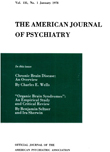TEACHING THE PRINCIPLES OF AMBULANT PSYCHOTHERAPY
Abstract
In summary, the teaching of the principles of ambulant psychotherapy depends upon the development in the trainee of sufficient personal security to facilitate a helpful relationship to the patient and sufficient sophistication to promote adequate communication. These goals can be achieved if the staff has broad clinical experience, can provide a broad spectrum of psychodynamic theory and insists that the trainee is confronted by a range of patient material beginning with persons culturally similar to himself and extending from this beginning to as wide a cultural range as the situation will permit.
Access content
To read the fulltext, please use one of the options below to sign in or purchase access.- Personal login
- Institutional Login
- Sign in via OpenAthens
- Register for access
-
Please login/register if you wish to pair your device and check access availability.
Not a subscriber?
PsychiatryOnline subscription options offer access to the DSM-5 library, books, journals, CME, and patient resources. This all-in-one virtual library provides psychiatrists and mental health professionals with key resources for diagnosis, treatment, research, and professional development.
Need more help? PsychiatryOnline Customer Service may be reached by emailing [email protected] or by calling 800-368-5777 (in the U.S.) or 703-907-7322 (outside the U.S.).



